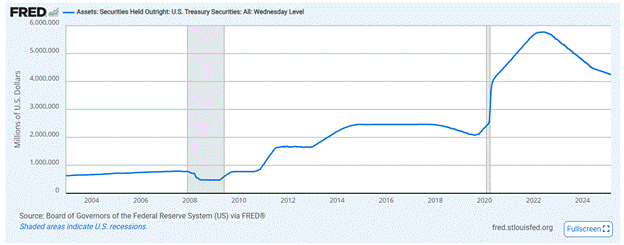As of early March, the Department of Government Efficiency (DOGE) reports savings exceeding $100 billion, attributed to the:
Combination of asset sales, contract/lease cancellations and renegotiations, fraud and improper payment deletion, grant cancellations, interest savings, programmatic changes, regulatory savings, and workforce reductions.
Ignoring the potential for recession and financial crisis, which the Federal Reserve would address with a multi-trillion-dollar monetary inflation, if DOGE maintains its current savings rate and the Trump gold card generates additional revenue, we can consider how to utilize those savings.
Approximately sixty years ago, in What You Should Know About Inflation, Henry Hazlitt noted the abundance of speeches advocating for increased federal expenditures or taxes. He then writes:
But I have yet to see an article that discusses how we could begin and increase an annual repayment of the debt in proportion to the increase in our gross national product.
One scenario is direct debt reduction. Assuming the US government can selectively repay any debt holder at its discretion, the question becomes, which debt holder should be paid first?
See below for the list of foreign debt holders as of December 2024, per Statista.
It’s remarkable that, within two months of operation, DOGE has generated sufficient savings to fully repay the debt owed to Mexico or Germany. Should this pace continue, the US government could potentially settle its obligations to Switzerland, France, or the northern nation of Canada.
However, the ramifications would be significant. Repaying China, for instance, might reduce foreign dependency, but it would simultaneously provide China with a substantial influx of greenbacks, nearly 800 billion of them.
What they’ll do next is anyone’s guess, but the $700+ billion in US debt China currently holds may be indicative of some risk appetite. They could even turn around and buy more debt, like a type of refinancing.
On the other hand, this return of capital could empower the Chinese government to aggressively acquire American stocks, corporate bonds, cryptocurrency, or land. Even indirectly, by funding Chinese citizens’ real estate purchases, they could gain significant US holdings… Ironically, the entire scenario appears detrimental to American interests.
Regarding domestic US debt holders, Visual Capitalist shows the total was around $26 trillion as of 2023.
Full repayment would flood pensions, funds, and banks with cash, forcing them to reinvest. But what would they buy, if not US debt?
Lastly, there’s the Federal Reserve’s $4.3 trillion US treasury holding.

Any debt reduction paid to the Federal Reserve would equate to deleting that amount on the Fed’s balance sheet, sending it back to the ether. The debt would shrink, and the current and future interest cost savings could be significant.
Paying off foreign, domestic, or Federal Reserve debt holders presents a paradox: handing over vast sums to those who value holding that debt. Maybe that’s why Henry Hazlitt remarked that he’d never seen an article on debt repayment.
It’s troubling because debt is easily created, but difficult to extinguish. Perhaps the simplest solution is best. When it comes to government action, the answer remains the same: do nothing.
Should the US government miraculously achieve a year-end surplus, direct debt repayment might be unnecessary. Instead, it could focus on reducing expenditures and preventing future debt increases. Over time, debt requirements would decrease, leading to a reduced supply of new debt. This could influence factors like credit scores and lending rates.
The USA is lucky and good in many ways, but in a world of ever-increasing uncertainty and monetary inflation, a US government that spends less than it takes in would only get stronger and maintain its de facto gold standard by being the cleanest shirt in the dirty pile.
